Unit1 A Land of Diversity--Grammar名词性从句 (共36张PPT)
文档属性
| 名称 | Unit1 A Land of Diversity--Grammar名词性从句 (共36张PPT) |  | |
| 格式 | zip | ||
| 文件大小 | 184.7KB | ||
| 资源类型 | 教案 | ||
| 版本资源 | 人教版(新课程标准) | ||
| 科目 | 英语 | ||
| 更新时间 | 2018-11-06 09:21:54 | ||
图片预览

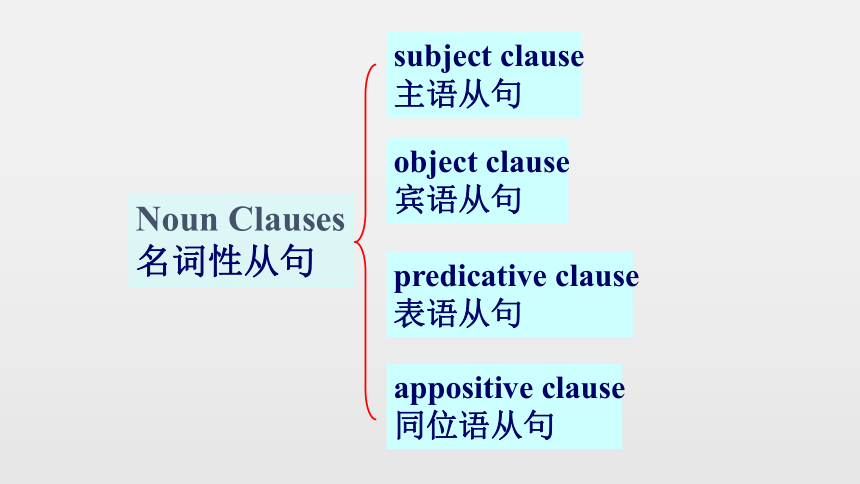

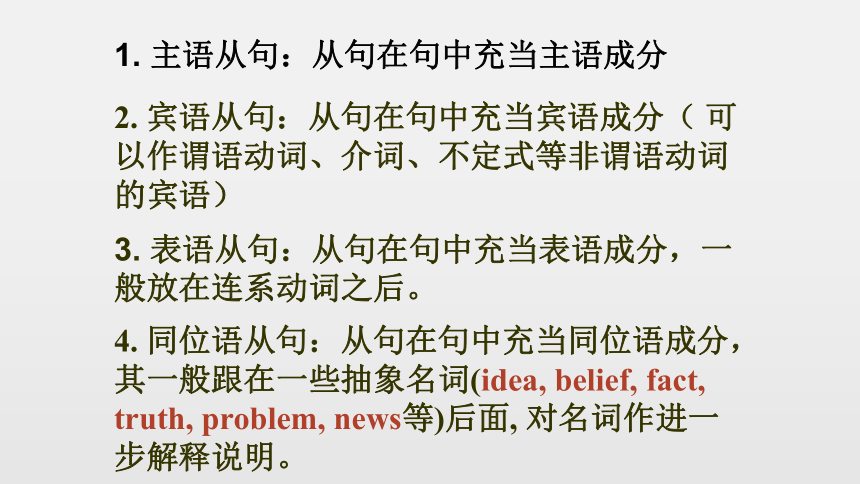
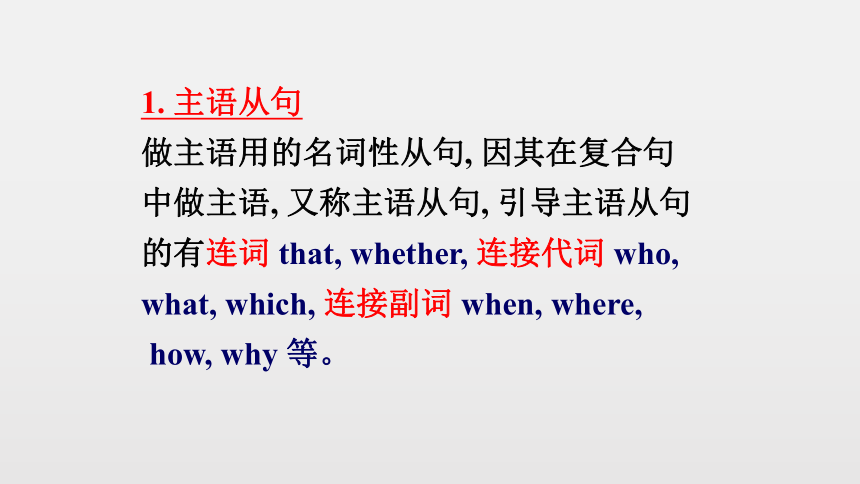
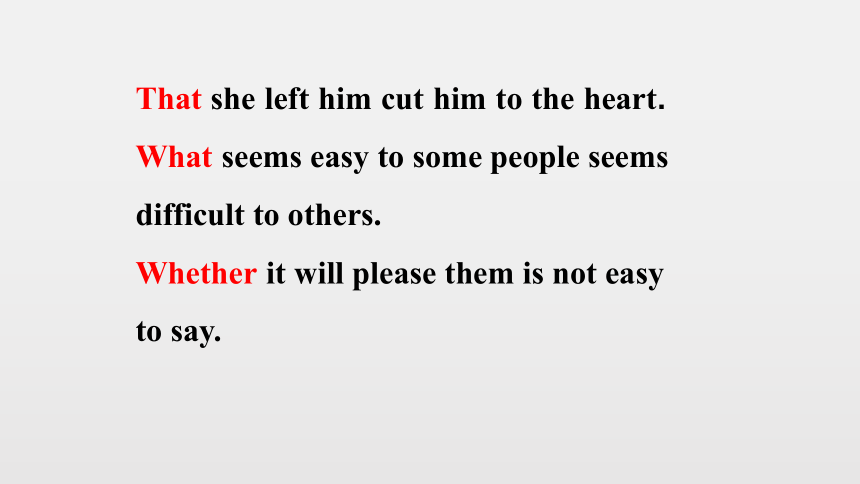
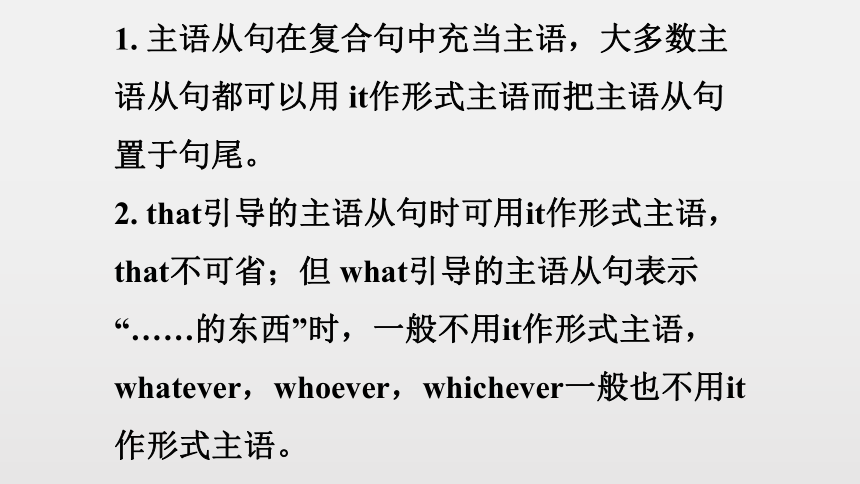
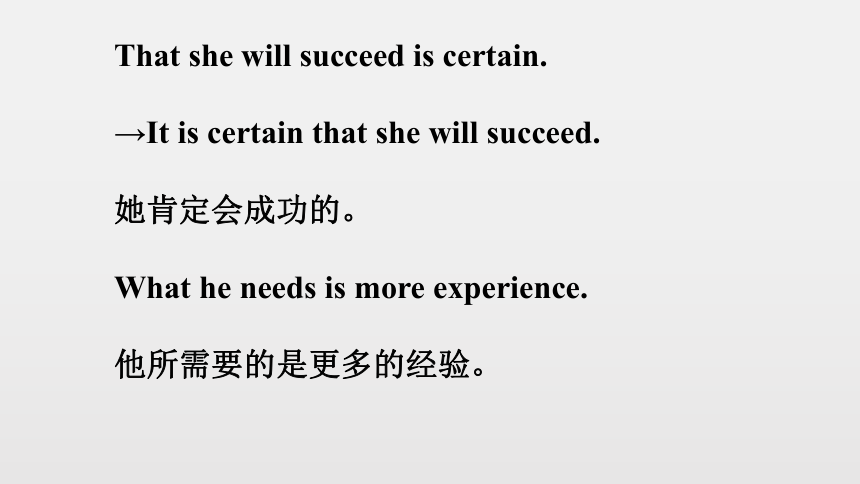
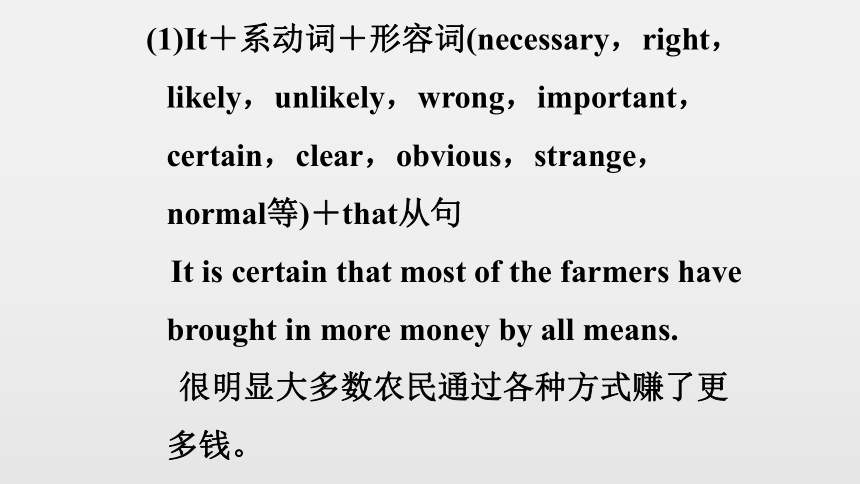
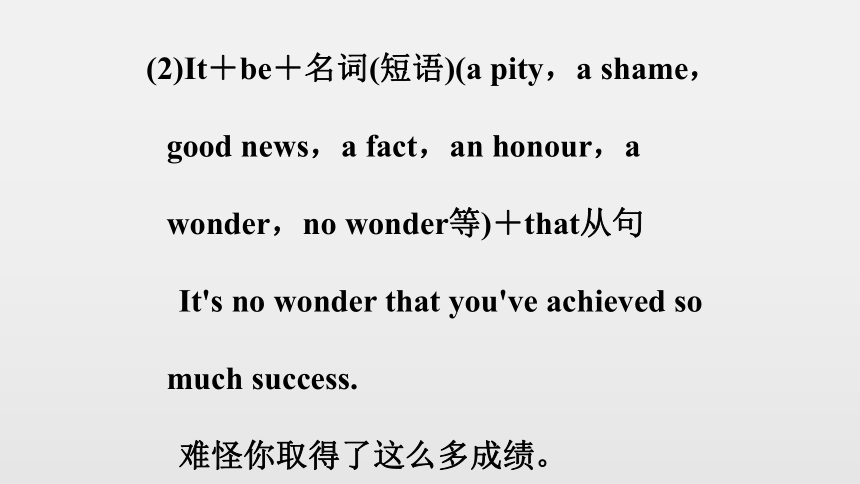
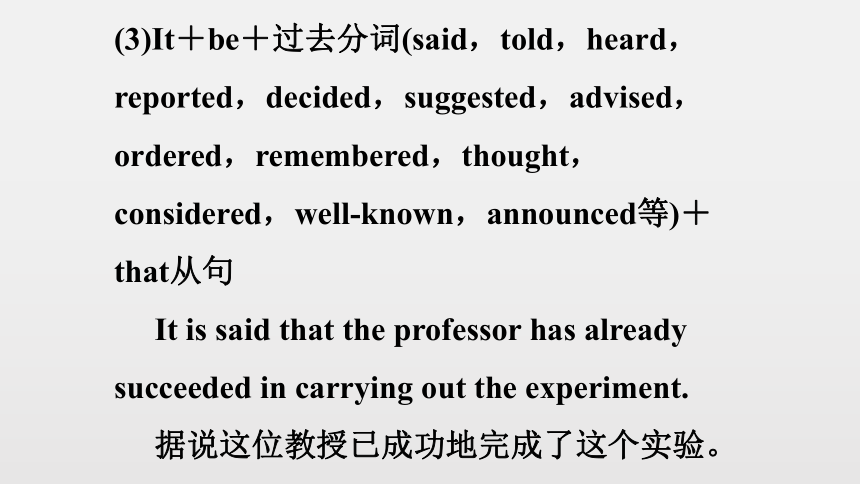
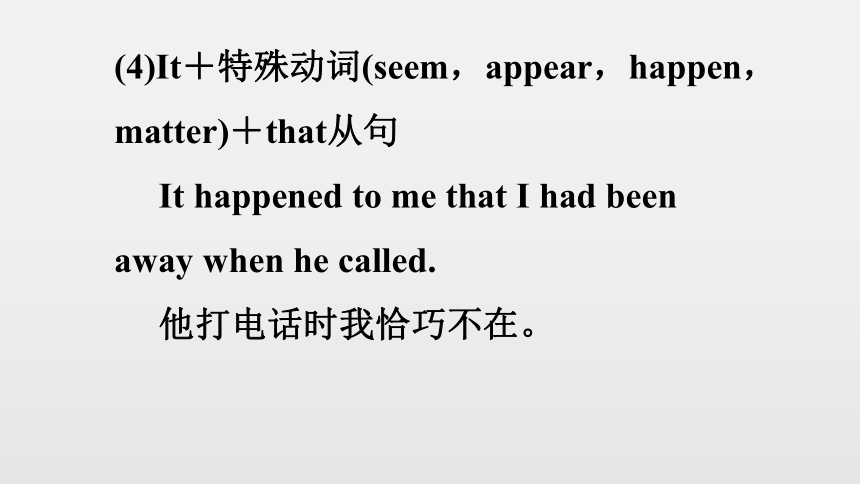
文档简介
课件36张PPT。Learning about language
Revising
useful
structuresNoun Clauses
名词性从句subject clause
主语从句object clause
宾语从句predicative clause
表语从句appositive clause
同位语从句名词性从句相当于名词,可分别作主句的主语、
表语、宾语和同位语。因此,名词性从句可
分为主语从句、表语从句、宾语从句和
同位语从句。1. What it was to become was a mystery.
2. I don’t know who will help Henry to
win the bet.
3. His trouble is that he doesn’t know
anybody in London.
4. The fact that ships can go there surprises
many people.主语从句宾语从句表语从句同位语从句1. 主语从句:从句在句中充当主语成分2. 宾语从句:从句在句中充当宾语成分( 可以作谓语动词、介词、不定式等非谓语动词的宾语)3. 表语从句:从句在句中充当表语成分,一般放在连系动词之后。4. 同位语从句:从句在句中充当同位语成分,其一般跟在一些抽象名词(idea, belief, fact, truth, problem, news等)后面, 对名词作进一步解释说明。1. 主语从句
做主语用的名词性从句, 因其在复合句
中做主语, 又称主语从句, 引导主语从句
的有连词 that, whether, 连接代词 who,
what, which, 连接副词 when, where,
how, why 等。That she left him cut him to the heart.
What seems easy to some people seems
difficult to others.
Whether it will please them is not easy
to say. 1. 主语从句在复合句中充当主语,大多数主语从句都可以用 it作形式主语而把主语从句置于句尾。
2. that引导的主语从句时可用it作形式主语,that不可省;但 what引导的主语从句表示“……的东西”时,一般不用it作形式主语,whatever,whoever,whichever一般也不用it作形式主语。That she will succeed is certain.
→It is certain that she will succeed.
她肯定会成功的。
What he needs is more experience.
他所需要的是更多的经验。(1)It+系动词+形容词(necessary,right,likely,unlikely,wrong,important,certain,clear,obvious,strange,normal等)+that从句
It is certain that most of the farmers have brought in more money by all means.
很明显大多数农民通过各种方式赚了更多钱。(2)It+be+名词(短语)(a pity,a shame,good news,a fact,an honour,a wonder,no wonder等)+that从句
It's no wonder that you've achieved so much success.
难怪你取得了这么多成绩。(3)It+be+过去分词(said,told,heard,reported,decided,suggested,advised,ordered,remembered,thought,considered,well-known,announced等)+that从句
It is said that the professor has already succeeded in carrying out the experiment.
据说这位教授已成功地完成了这个实验。(4)It+特殊动词(seem,appear,happen,matter)+that从句
It happened to me that I had been away when he called.
他打电话时我恰巧不在。[注意]
(1)在“It is necessary,important,strange,natural+that从句”结构中,从句常用(should)+动词原形形式。
It is necessary and important that one (should) master the skill of operating computers so as to meet the need of a job.
为了找工作,掌握电脑操作技巧是很有必要并且是很重要的。(2)在“It+be+suggested,advised,ordered,requested,
insisted,required+that从句”结构中,that从句应用“(should)+动词原形”。
It was suggested that they(should)start at once.
有人建议他们应该立即开始。2. 宾语从句
宾语从句在复合句中起宾语作用,可以
作动词的宾语,也可以作介词的宾语。
引导宾语从句词有连词that, if,
whether; 连接代词who, whose, what,
which; 连接副词 when, where, how,
Why 等。
1) I think (that) women can reach very
high achievements in many fields of
science.
2) I wonder whether/if she remembered
how many babies she had delivered.
3) Do you know who/whom Jack was
speaking to?宾语从句可分为三类:动词的宾语从句、介词的宾语从句和形容词的宾语从句。
1.动词的宾语从句
(1)大多数动词(hope,tell,say,know,think,consider,imagine,hear,expect,suppose,guess等)可以带宾语从句。
We all expect that they will win,for members of their team are stronger.
我们都预料他们会赢,因为他们的队员更强壮。[注意]
在think,believe,suppose,expect等动词引导的宾语从句中,有时谓语尽管是否定意思,却不用否定形式,而将think等动词变为否定形式,这一现象称为否定前移。
I don't think you are right.我想你是不对的。
I don't suppose he cares,does he?
我看他不在乎,对吧?(2)动词find,feel,think,consider,make,believe等后有宾语补足语时,则需要it作形式宾语而将that宾语从句后置。
I think it necessary that we take plenty of boiled water every day.
我认为每天多喝开水是有必要的。有些动词带宾语从句时习惯上需要在宾语从句前加it。这类动词(词组)有hate,enjoy,like,love,dislike,see to等。
I hate it when they talk with their mouths full.
我讨厌他们说话时嘴里含着食物。2.一般情况下介词后只能用wh-类连接词引导宾语从句。
We are talking about whether we admit students into our club.
我们正在讨论是否让学生加入我们的俱乐部。[注意]
(1)where引导的从句有时也可用作介词的宾语。
We could see the temple quite clearly from where we lived.
从我们住的地方可以很清楚地看到这座寺庙。
(2)that引导的从句作介词宾语时是很少有的,只有在 except,in,but等介词后偶尔可能用到。Your composition is quite good except that the organization is a bit loose.
除了结构有点松散以外,你的作文相当不错。
3.sure,certain,glad,pleased,happy,surprised等表示“情感”的形容词后也可带宾语从句。
I'm sure that they will make it in spite of the terrible weather. 我确信不管天气多么恶劣,他们都会取得成功的。3.表语从句
表语从句在复合句中起表语作用。
引导表语从句词有连词 that, whether, what,
which, who, whom, whose 等。 what,
which, who, whom, whose除在句子中起
连接作用外, 还可在从句中充当主语、
表语、定语, 且各有各的词义。Tom is no longer what he used to be.
The question is which of us should come
first.
The problem is who is really fit for the
hard job.
The important thing is whose name
should be put on the top of the list.[注意]
1.如主句的主语是idea,advice,suggestion,order, request,requirement等名词时,则表语从句的谓语应用虚拟语气,即“(should)+动词原形”的形式。
His suggestion is that we (should) change our course.
他的建议是我们应该改变路线。2.主语为名词reason时,表语从句中的连接词要用that、而不用why或because。
The reason for such a serious accident is that the driver was too careless and drunk.这么严重的交通事故是由于司机太粗心、喝酒太多造成的。
3.because,as if,as though,as,like等连接词也可引导表语从句。
He has heart disease. That is because he has been smoking too much. 他有心脏病,那是因为他抽烟太多了。(2)whether与if的用法比较
二者均可作“是否”讲,都可以引导名词性从句,引导 宾语从句可以互换。
I don't know whether/if he'll attend the meeting. 我不知道他是否会参加这会议。
在下列情况下,常用whether,不用if。
①whether引导从句可以放于句首。
Whether he comes or not makes no difference.
他来不来都一样。②whether可引导表语从句和同位语从句,if不可。
The question whether he should join the team has not been decided upon.
他是否入队的问题还没决定。
The question is whether it is worth trying.
问题是这是否值得一试。③whether可以作介词宾语,if则不可。
I haven't settled the question of whether I'll lend him the money.关于是否借给他钱的问题,我还没做决定。④whether后可以加不定式,if不可。
He didn't know whether to get married or to wait.
他不知道是结婚还是再等等。
⑤可以说whether...or引导让步状语从句,“无论,不论”,if则不可。
Whether it rains or snows,I don't care.
不论下雨还是下雪,我都不在乎了。Suggested answers to Exercise 3 on Page 5:
1. She pretended that she was a socialist, believing in socialism.
2. It is not surprising that so many people love California.
3. Why she didn’t tell you herself is what I can’t explain/ what I want to know.
4. I wonder why she lied to me.
5. The trouble was that she had lost her passport.
6. It is essential that you get a visa before you travel to the USA.
7. What George discovered in California was different from what he saw in the movies.
8. Where they got all that money is what I want to know/ what I can’t explain.
Suggested answers to Exercise 4 on Page 5:
Alice: Not really. The problem is that it’s too late to do what I really wanted to.
Alice: Well, I wanted to go to New York. But I’ve found out that all the hotels are full.
Alice: Yes. It didn’t occur to me that there’d be a big festival on at the same time as my holiday.
Alice: I suppose that it’s worth trying.occur vi.发生;出现
Sth occurred to sb. 某人想起…
It occurred to/hit/struck sb that…
某人想起…
It didn’t occur to him that she would refuse his invitation.
他没有想到她会拒绝他的邀请。
Revising
useful
structuresNoun Clauses
名词性从句subject clause
主语从句object clause
宾语从句predicative clause
表语从句appositive clause
同位语从句名词性从句相当于名词,可分别作主句的主语、
表语、宾语和同位语。因此,名词性从句可
分为主语从句、表语从句、宾语从句和
同位语从句。1. What it was to become was a mystery.
2. I don’t know who will help Henry to
win the bet.
3. His trouble is that he doesn’t know
anybody in London.
4. The fact that ships can go there surprises
many people.主语从句宾语从句表语从句同位语从句1. 主语从句:从句在句中充当主语成分2. 宾语从句:从句在句中充当宾语成分( 可以作谓语动词、介词、不定式等非谓语动词的宾语)3. 表语从句:从句在句中充当表语成分,一般放在连系动词之后。4. 同位语从句:从句在句中充当同位语成分,其一般跟在一些抽象名词(idea, belief, fact, truth, problem, news等)后面, 对名词作进一步解释说明。1. 主语从句
做主语用的名词性从句, 因其在复合句
中做主语, 又称主语从句, 引导主语从句
的有连词 that, whether, 连接代词 who,
what, which, 连接副词 when, where,
how, why 等。That she left him cut him to the heart.
What seems easy to some people seems
difficult to others.
Whether it will please them is not easy
to say. 1. 主语从句在复合句中充当主语,大多数主语从句都可以用 it作形式主语而把主语从句置于句尾。
2. that引导的主语从句时可用it作形式主语,that不可省;但 what引导的主语从句表示“……的东西”时,一般不用it作形式主语,whatever,whoever,whichever一般也不用it作形式主语。That she will succeed is certain.
→It is certain that she will succeed.
她肯定会成功的。
What he needs is more experience.
他所需要的是更多的经验。(1)It+系动词+形容词(necessary,right,likely,unlikely,wrong,important,certain,clear,obvious,strange,normal等)+that从句
It is certain that most of the farmers have brought in more money by all means.
很明显大多数农民通过各种方式赚了更多钱。(2)It+be+名词(短语)(a pity,a shame,good news,a fact,an honour,a wonder,no wonder等)+that从句
It's no wonder that you've achieved so much success.
难怪你取得了这么多成绩。(3)It+be+过去分词(said,told,heard,reported,decided,suggested,advised,ordered,remembered,thought,considered,well-known,announced等)+that从句
It is said that the professor has already succeeded in carrying out the experiment.
据说这位教授已成功地完成了这个实验。(4)It+特殊动词(seem,appear,happen,matter)+that从句
It happened to me that I had been away when he called.
他打电话时我恰巧不在。[注意]
(1)在“It is necessary,important,strange,natural+that从句”结构中,从句常用(should)+动词原形形式。
It is necessary and important that one (should) master the skill of operating computers so as to meet the need of a job.
为了找工作,掌握电脑操作技巧是很有必要并且是很重要的。(2)在“It+be+suggested,advised,ordered,requested,
insisted,required+that从句”结构中,that从句应用“(should)+动词原形”。
It was suggested that they(should)start at once.
有人建议他们应该立即开始。2. 宾语从句
宾语从句在复合句中起宾语作用,可以
作动词的宾语,也可以作介词的宾语。
引导宾语从句词有连词that, if,
whether; 连接代词who, whose, what,
which; 连接副词 when, where, how,
Why 等。
1) I think (that) women can reach very
high achievements in many fields of
science.
2) I wonder whether/if she remembered
how many babies she had delivered.
3) Do you know who/whom Jack was
speaking to?宾语从句可分为三类:动词的宾语从句、介词的宾语从句和形容词的宾语从句。
1.动词的宾语从句
(1)大多数动词(hope,tell,say,know,think,consider,imagine,hear,expect,suppose,guess等)可以带宾语从句。
We all expect that they will win,for members of their team are stronger.
我们都预料他们会赢,因为他们的队员更强壮。[注意]
在think,believe,suppose,expect等动词引导的宾语从句中,有时谓语尽管是否定意思,却不用否定形式,而将think等动词变为否定形式,这一现象称为否定前移。
I don't think you are right.我想你是不对的。
I don't suppose he cares,does he?
我看他不在乎,对吧?(2)动词find,feel,think,consider,make,believe等后有宾语补足语时,则需要it作形式宾语而将that宾语从句后置。
I think it necessary that we take plenty of boiled water every day.
我认为每天多喝开水是有必要的。有些动词带宾语从句时习惯上需要在宾语从句前加it。这类动词(词组)有hate,enjoy,like,love,dislike,see to等。
I hate it when they talk with their mouths full.
我讨厌他们说话时嘴里含着食物。2.一般情况下介词后只能用wh-类连接词引导宾语从句。
We are talking about whether we admit students into our club.
我们正在讨论是否让学生加入我们的俱乐部。[注意]
(1)where引导的从句有时也可用作介词的宾语。
We could see the temple quite clearly from where we lived.
从我们住的地方可以很清楚地看到这座寺庙。
(2)that引导的从句作介词宾语时是很少有的,只有在 except,in,but等介词后偶尔可能用到。Your composition is quite good except that the organization is a bit loose.
除了结构有点松散以外,你的作文相当不错。
3.sure,certain,glad,pleased,happy,surprised等表示“情感”的形容词后也可带宾语从句。
I'm sure that they will make it in spite of the terrible weather. 我确信不管天气多么恶劣,他们都会取得成功的。3.表语从句
表语从句在复合句中起表语作用。
引导表语从句词有连词 that, whether, what,
which, who, whom, whose 等。 what,
which, who, whom, whose除在句子中起
连接作用外, 还可在从句中充当主语、
表语、定语, 且各有各的词义。Tom is no longer what he used to be.
The question is which of us should come
first.
The problem is who is really fit for the
hard job.
The important thing is whose name
should be put on the top of the list.[注意]
1.如主句的主语是idea,advice,suggestion,order, request,requirement等名词时,则表语从句的谓语应用虚拟语气,即“(should)+动词原形”的形式。
His suggestion is that we (should) change our course.
他的建议是我们应该改变路线。2.主语为名词reason时,表语从句中的连接词要用that、而不用why或because。
The reason for such a serious accident is that the driver was too careless and drunk.这么严重的交通事故是由于司机太粗心、喝酒太多造成的。
3.because,as if,as though,as,like等连接词也可引导表语从句。
He has heart disease. That is because he has been smoking too much. 他有心脏病,那是因为他抽烟太多了。(2)whether与if的用法比较
二者均可作“是否”讲,都可以引导名词性从句,引导 宾语从句可以互换。
I don't know whether/if he'll attend the meeting. 我不知道他是否会参加这会议。
在下列情况下,常用whether,不用if。
①whether引导从句可以放于句首。
Whether he comes or not makes no difference.
他来不来都一样。②whether可引导表语从句和同位语从句,if不可。
The question whether he should join the team has not been decided upon.
他是否入队的问题还没决定。
The question is whether it is worth trying.
问题是这是否值得一试。③whether可以作介词宾语,if则不可。
I haven't settled the question of whether I'll lend him the money.关于是否借给他钱的问题,我还没做决定。④whether后可以加不定式,if不可。
He didn't know whether to get married or to wait.
他不知道是结婚还是再等等。
⑤可以说whether...or引导让步状语从句,“无论,不论”,if则不可。
Whether it rains or snows,I don't care.
不论下雨还是下雪,我都不在乎了。Suggested answers to Exercise 3 on Page 5:
1. She pretended that she was a socialist, believing in socialism.
2. It is not surprising that so many people love California.
3. Why she didn’t tell you herself is what I can’t explain/ what I want to know.
4. I wonder why she lied to me.
5. The trouble was that she had lost her passport.
6. It is essential that you get a visa before you travel to the USA.
7. What George discovered in California was different from what he saw in the movies.
8. Where they got all that money is what I want to know/ what I can’t explain.
Suggested answers to Exercise 4 on Page 5:
Alice: Not really. The problem is that it’s too late to do what I really wanted to.
Alice: Well, I wanted to go to New York. But I’ve found out that all the hotels are full.
Alice: Yes. It didn’t occur to me that there’d be a big festival on at the same time as my holiday.
Alice: I suppose that it’s worth trying.occur vi.发生;出现
Sth occurred to sb. 某人想起…
It occurred to/hit/struck sb that…
某人想起…
It didn’t occur to him that she would refuse his invitation.
他没有想到她会拒绝他的邀请。
